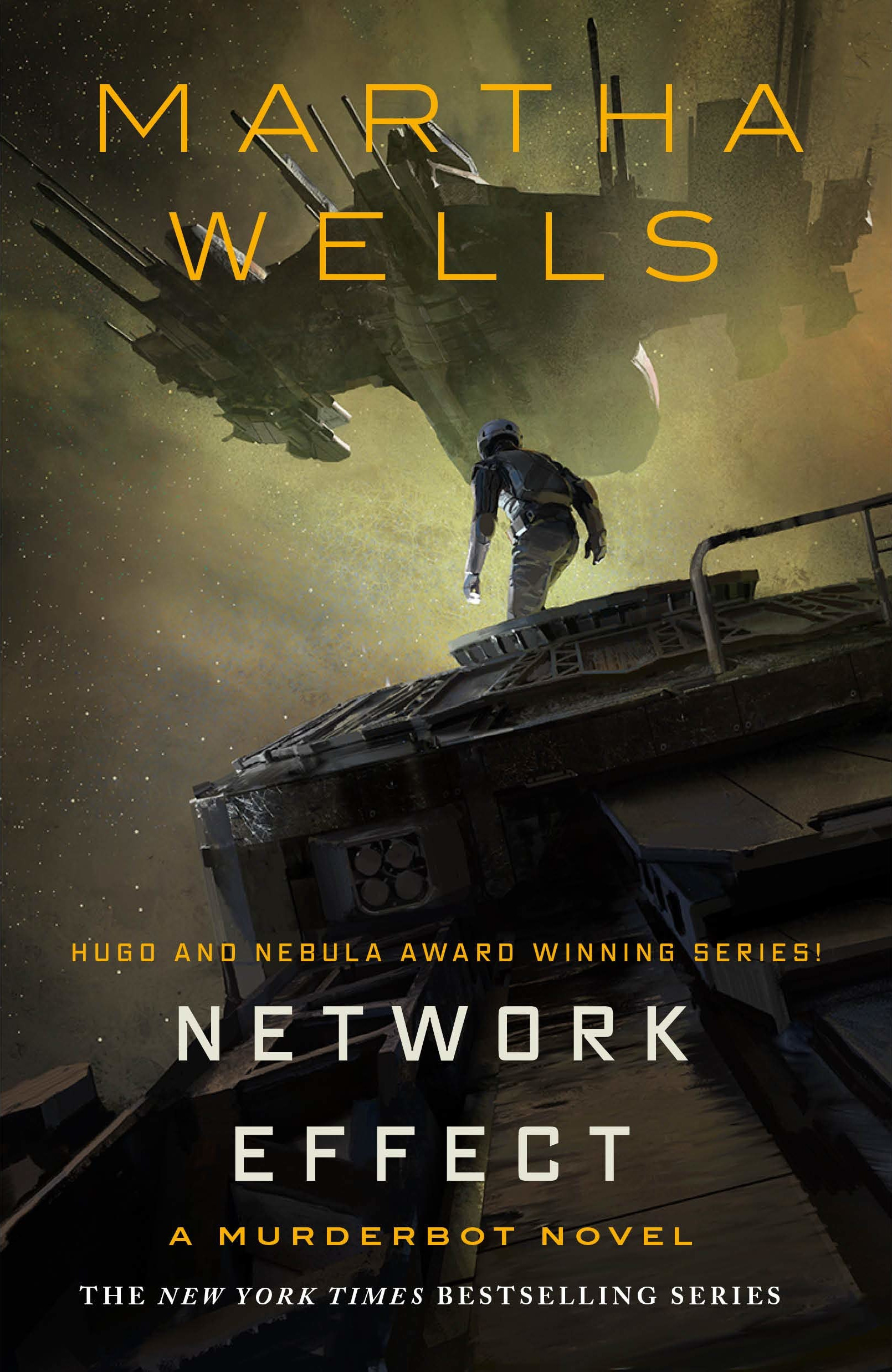 After
reading a couple of short stories in this series, including one that's an intro to the humans
in ART/Perihelion's crew (see Artificial
Condition), I felt that I was ready to start catching up on Murderbot stories. Yes,
it was good to get back.
After
reading a couple of short stories in this series, including one that's an intro to the humans
in ART/Perihelion's crew (see Artificial
Condition), I felt that I was ready to start catching up on Murderbot stories. Yes,
it was good to get back.The story opens up with Murderbot providing security for a research trip at the request of Dr. Mensah. Besides some friends of Murderbot's, there's also some of Dr. Mensah's family members on the mission. Not everyone appreciates Murderbot's expertise—it is a SecUnit after all—but you know they will eventually.
Oh and some thugs try to rob the expedition and hint at possible kidnapping.
Nobody fucking listens to me.After that "welcome back" scene, there are some flashbacks and then the story soon moves into the main plot: On their way home from the mission, they're ambushed by a much larger ship and, despite Murderbot's efforts, are captured. Before they can be rescued, the captor ship escapes through a wormhole.
From here, Murderbot has to fight off the attackers, figure out who they are, and where they came from. ART shows up (it's more complicated than just showing up but explaining it would be a spoiler) and needs to have its crew rescued from the same raiders that attacked Murderbot's humans. The situation gets messy, and Murderbot is overwhelmed. That leads to an unlikely alliance of rescuers.
Feelings—Murderbot's dreaded f-word—make their way into the story, forcing Murderbot to have to confront them, which often leads to a system reset. But sometimes it's better at dealing with some feelings than others. For instance, there's another SecUnit in the story, just hanging around waiting to die (its clients are prisoners of the raiders). Murderbot recognizes the predicament this other SecUnit is in, so it makes it an offer: "I can disable your governor module. I'll do that whether you help me or not." Translation: I'll break the chains that bind you, that enslave you, that can kill you, and you don't owe me a thing. It's such a wonderful act of selfless compassion from a snarky person who claims not to care about others, except when it so obviously does.
4.5 stars
\_/
DED
 Found this at the annual C.H. Booth Library book
sale. It's a standalone in the Alliance-Union Universe of which Downbelow Station
is probably the most well-known. Having recently read The Pride of Chanur, I was curious
to read something else by C.J. Cherryh. Unfortunately, this one wasn't as enjoyable.
Found this at the annual C.H. Booth Library book
sale. It's a standalone in the Alliance-Union Universe of which Downbelow Station
is probably the most well-known. Having recently read The Pride of Chanur, I was curious
to read something else by C.J. Cherryh. Unfortunately, this one wasn't as enjoyable. Rosewater
is a town on the edge. A community formed around the edges of a mysterious alien biodome, its residents
comprise the hopeful, the hungry and the helpless—people eager for a glimpse inside the dome or
a taste of its rumored healing powers.
Rosewater
is a town on the edge. A community formed around the edges of a mysterious alien biodome, its residents
comprise the hopeful, the hungry and the helpless—people eager for a glimpse inside the dome or
a taste of its rumored healing powers.
 I
wasn't planning on reading this book. While I enjoyed the first few Van Halen albums—I
checked out after 1984—there are a lot more people further up on the fan
spectrum than me. But a friend of mine loaned it to me, thinking that I might enjoy
reading it (I'd loaned him Bruce Dickinson's What Does This Button Do?, so fair
exchange). And yes, to some extent, I did enjoy reading it.
I
wasn't planning on reading this book. While I enjoyed the first few Van Halen albums—I
checked out after 1984—there are a lot more people further up on the fan
spectrum than me. But a friend of mine loaned it to me, thinking that I might enjoy
reading it (I'd loaned him Bruce Dickinson's What Does This Button Do?, so fair
exchange). And yes, to some extent, I did enjoy reading it.

 This
is the fourth book in the series and it contains four stories.
This
is the fourth book in the series and it contains four stories.
 This
is another entry in the alien invasion genre, one of the longest running plots in science fiction.
War of the Worlds, probably the most well known work in this category, first appeared in
print in 1897 (the novel in 1898). Hollywood spawned too many alien invasion movies to count in the
1950s and 60s. After a bit of a break—disaster movies and sci-fi adventures dominated the
70s—the sub-genre diversified. Some aliens were just stopping by to say "Hi" (Close Encounters
of the Third Kind, E.T., Starman), while some were here to eat us (numerous horror movies).
Footfall stuck to the invasion part, but mixed things up a bit.
This
is another entry in the alien invasion genre, one of the longest running plots in science fiction.
War of the Worlds, probably the most well known work in this category, first appeared in
print in 1897 (the novel in 1898). Hollywood spawned too many alien invasion movies to count in the
1950s and 60s. After a bit of a break—disaster movies and sci-fi adventures dominated the
70s—the sub-genre diversified. Some aliens were just stopping by to say "Hi" (Close Encounters
of the Third Kind, E.T., Starman), while some were here to eat us (numerous horror movies).
Footfall stuck to the invasion part, but mixed things up a bit.

 When
Tully, a fugitive from a spaceship captured by the arrogant, thieving, rodent-like Kif, takes refuge on the
Pride of Chanur, a merchant vessel belonging to a clan of the lion-like Hani, Pyanfar Chanur, its captain, gives
him shelter, in spite of all the dangers she and her crew will face.
When
Tully, a fugitive from a spaceship captured by the arrogant, thieving, rodent-like Kif, takes refuge on the
Pride of Chanur, a merchant vessel belonging to a clan of the lion-like Hani, Pyanfar Chanur, its captain, gives
him shelter, in spite of all the dangers she and her crew will face.
 An
excellent finish.
An
excellent finish. Wow, that was something!
Wow, that was something! The
collapse of The Flow, the interstellar pathway between the planets of the Interdependency, has
accelerated. Entire star systems―and billions of people―are becoming cut off from the rest of
human civilization. This collapse was foretold through scientific prediction... and yet, even
as the evidence is obvious and insurmountable, many still try to rationalize, delay and profit
from, these final days of one of the greatest empires humanity has ever known.
The
collapse of The Flow, the interstellar pathway between the planets of the Interdependency, has
accelerated. Entire star systems―and billions of people―are becoming cut off from the rest of
human civilization. This collapse was foretold through scientific prediction... and yet, even
as the evidence is obvious and insurmountable, many still try to rationalize, delay and profit
from, these final days of one of the greatest empires humanity has ever known.
 This
is book one in the third and final trilogy of trilogies that compose this series.
This
is book one in the third and final trilogy of trilogies that compose this series.